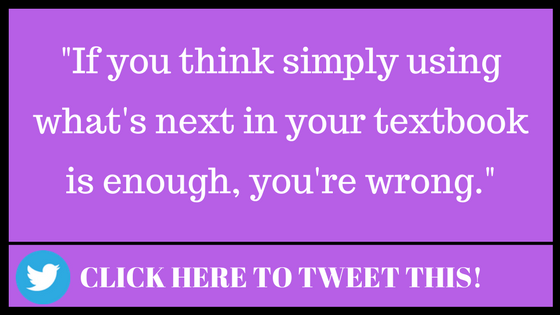As I continue working with more and more teachers I’m often surprised at how many I still see “page turning” to plan instruction. “Page turning” is a form of lesson planning that a teacher uses, that is simply opening a textbook and continuing where they left off during the last lesson. Now don’t get me wrong, textbooks have their place in education (I guess), but when teachers rely on them too heavily instruction can suffer greatly, and more importantly, learning does too.
Here are a few reasons you should get textbooks out of your lesson planning and start forging your own instructional path, outside the edges of those pages.
Textbooks Fail To Engage Students.
I don’t care how many pictures or fun activities exist in the realm of the book you are using, I will almost guarantee that it is not engaging all your students. The simple reason is that the writers of that book don’t know your students, YOU DO. I have never (and will never) heard a student mutter “Wow! Chapter 7 was surprisingly fun and exciting! I can’t wait to continue working to Chapter 8!” I would bet that you haven’t either. That’s because textbooks are designed as a curriculum TOOL to be used in lesson planning, not a curriculum in themselves. Students must interact, play with, and experience concepts, not just read about them. (or hear about them during your lectures…which don’t work either by the way.)
Textbooks Are NOT Universally Designed.
Textbooks are generally written at or above the grade level you are teaching. The pictures, diagrams, and experiences presented in them are also created at that level. I don’t know about you, but most of my students, or at least some of them, were below grade level or still achieving their current grade level. I would also like to suggest that the context, circumstances, and lens in which most textbooks view your curriculum are not going to engage or allow for much adjustment or modification if they are your primary lesson planning tool.
A textbook can’t meet a student at their current level of understanding unless you literally get lucky enough for that 1 in a million shot when the exact section you’re on matches up with the single student that is ready for it in that exact moment. Teaching and instruction are dynamic and should be adjusted to the needs of the students. There are instructional methods that allow for this but teaching from a textbook isn’t one of them.
You may not be teaching your standards.
Depending on when you got your textbooks (most of us have had them for a while), you may have out-of-date or misaligned materials that you’re using to plan or provide instruction with. When we put on workshops, we commonly have to remind (really good) educators to take a look at their standards when designing instructional units so that they aren’t covering content that isn’t required. More often than you would think, they’re missing content completely because they are worried about the next chapter instead of what the standards actually want them to teach. Another interesting note is that if your textbooks are older, they were probably written before your standards.
Page Turning is NOT Planning.
Lesson planning should be a purposeful and data-driven experience. If you think simply using what’s next in your textbook is enough, you’re wrong. Instructional planning should take into account your students interests, multiple levels of understanding, differences in capabilities, and individual needs.
By leaning on a single source for what you’re going to do tomorrow, you are negating a lot of the factors that make instruction effective in the first place. This also provides very little purpose to your lesson planning, and more of just a cookie cutter approach. There is no educator in the world that can argue that this is an effective strategy to plan quality education with.
You Don’t Need Them. (Seriously)
If you teach directly from a textbook and are lecturing for most of your courses then I have some awful news for you. You will not have a job soon. The days of teachers needing to “deliver” information to the students are almost completely gone and the need for text on a written page that doesn’t automatically update is already gone. Students can now find all of those lectures and textbooks on a device that fits in their pocket.
I know the tone of this article was a bit harsh and I apologize. Actually, not really. I think I’m ok with the harsh tone and demeanor, because I strongly believe that education needs to change, and if you aren’t changing with it you’re quickly becoming part of the problem.
I’m confident that you are better than the teacher this blog is speaking to, and you’re note utilizing tools and strategies that we all know are ineffective and outdated. The price is too high and the cost is too great when you are dealing with the future of our world in the seats of your classroom. You’re better than a text book. You’re a teacher, a motivator, a coach, and a change agent. Don’t limit your lesson planning to the next page or chapter. Set your classroom and your students free, and always work toward helping them to truly enjoy learning and wanting to succeed. That’s why we do this, right?



